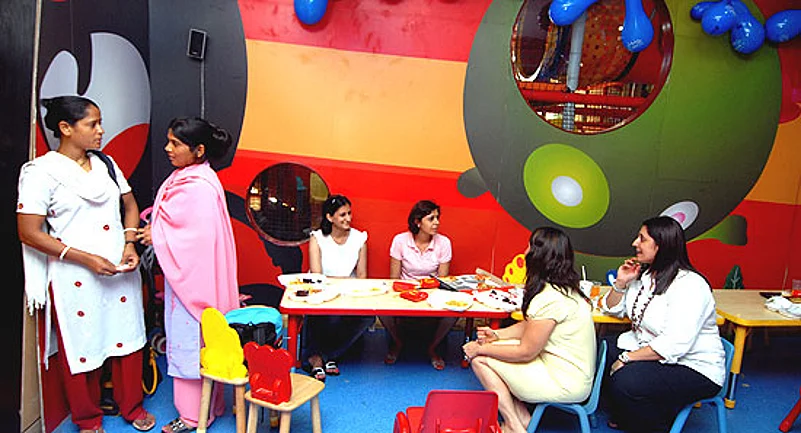Fear the beguilingly demure smile of a six-year-old. Especially when accompanied by a wistful listing of the treats on offer at the last blockbuster birthday party. It has the power to plunge you, against your better judgement, into a hallucinogenic world of balloons, buntings, jumping castles(lurid inflated mattresses on which kids maniacally jump up and down), disneyfied birthday cakes and three painful rounds of invitation—card, SMS and phonecall—the standard drill, at least in memory-deficient Delhi.
But for me, the real nightmare was lying quietly in wait. Only six tots out of the 30 invited turned up for the event I had struggled to organise, leaving me with a disappointed little hostess, mountains of food and a pile of infuriatingly useless return gifts. I tried to turn my frustration into reformist zeal and SMSed the defaulter mummies: Can we please be more considerate to each other?
In reply, some cited good reasons for the no-show, others were properly repentant, and, to my surprise, quite a few were outraged. My invitation, I learnt via return SMS, had “lacked warmth”; “was too casual”. How do u mean, I typed back, mystified. A few exchanges later, I got the point. In asking my 15-year-old son to make the regulation invitational phonecall (because I was travelling on work) I had committed a social solecism in aspirational kiddie party circles.
The next day, at the office lunch table, a hotbed of amateur sociology, I offered my birthday party disaster as dessert. “This is just like a wedding!” exclaimed a colleague. “People don’t show up unless you invite ‘properly’.” How like us, was the lunch-table verdict, to slavishly mimic this imported mode of celebration in all its fussy, frilly, fiddly (and market-dictated) detail, and then graft onto it our distinctively Indian notions of protocol, status and decorum.
Lunchtime sociology may lack, shall we say, a certain rigour, but I think in this instance we were spot on. In ’09, the aspirational kiddie birthday party is a monster hybrid; a cultural landmine; a showcase for the stranger aspects of urban Indian life.
Nothing makes that point better than the “maids’ boxes” I see piled up, every now and then, on the margins of a green lawn, a drawing room, or a hired party hall. (The boxes are not peculiar to our charming capital; I hear of their growing popularity a thousand miles away, in Mumbai.) Unpack this cardboard dabba with the insignia of the neighbourhood halwai emblazoned on it and you will find not just an unpretentious meal of a samosa, a laddoo, a piece of barfi or two, but telltale evidence of how the birthday party has mutated over time.
Modern-day mothers work, or have gyms to go to, or TV serials to watch; even if they do attend a birthday, they would rather not be stuffing pizza down the reluctant mouth of a hyper-excited kid. So blockbuster parties invariably have attendant squads of maids and nannies. And since the party menu has also mutated, it “makes sense”, as one mother briskly explained, to make “separate food arrangements” for them rather than have them eat their fill at lavish counters offering pasta, Chinese or “Continental”.
Looking back on your own childhood with the sepia-tinted glasses of middle age, you tend to idealise it as the golden age when everyone had a good time without abandoning good taste. So perhaps my happy memories of simple, cheerful, inter-generational birthday parties are more than a little suspect. But one thing I’m sure of: there wasn’t this culinary apartheid.
As I discuss this with my mother, however, other layers are unpeeled. When she grew up, in middle-class Nagpur, there were no birthday parties. Only very anglicised families had them; for her, she recalls, with a very slight trace of resentment in her voice, there was the very occasional bowl of kheer, or suji halwa. Her own mother, of course, didn’t know when she was born. September 4, the day we cut a cake for her, was a made-up date, probably for the benefit of kids clamouring to celebrate granny’s birthday.
From being denied recognition of your individuality to luxuriating in the said recognition is a long journey. A good journey, a bad journey? I don’t know, let the real sociologists decide. I, meanwhile, have a job to do. Gently convincing a six-going-on-seven-year-old that real individuality lies not in following the herd down every bylane and alleyway of 21st century excess, but daring to be different. In short, not having a birthday party next year.


























